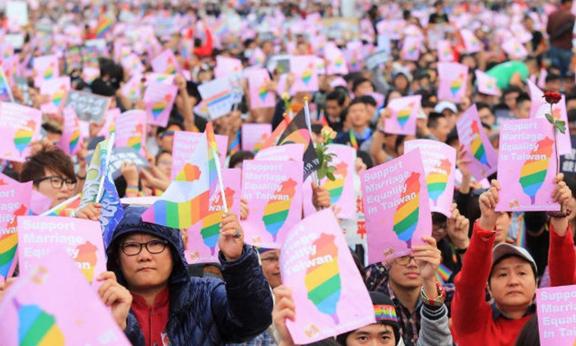
Even before this, Chia-Wei had done the truly unthinkable. He had gone on Taiwanese national television and come out as gay. In today’s world of Chinese-dubbed Ru Paul such an act may not turn a single head, but it was outrageous in White Terror-era Taiwan.
For years after, he and others campaigned around causes such as HIV-AIDs and equality for sexual minorities. Taiwan, like everywhere else, was slow to change.
Taiwan’s transition to democracy began around the time that China’s was crushed. In the late 1980s and early 1990s the democratic movement in Taiwan exploded, releasing a political momentum that carried a whole range of social movements forward to this day. The queer rights movement was one.
Taipei Pride is by far the largest LGBTQ rights protest movement in Asia, and unlike in other parts of the world, maintains a political character. Each year it draws in around 60,000 participants from all over Taiwan, as well as from Korea, Japan and Hong Kong, who recognise Taiwan for its unique status as the most advanced country on LGBTQ issues in the region.
In recent years, equal marriage has been a key demand and separate protests specifically around the issue have mobilised almost 250,000 people at a time in the streets of Taipei, the largest city and capital.
In the recent flurry of marriage equality victories, most countries in Asia have been left behind or have resisted the trend. Only in Taiwan have the rusty cogs of legislative machinery turned in favour of recognising it, but not without resistance from conservatives and the Christian right.
What makes Taiwan different is its protest culture and the sheer number of people ready to take to the streets to fight for change. This, above all else, is what is keeping the pressure on legislators to get equal marriage over the line.
In May 2017, Taiwan’s Council of Grand Justices ruled marriage discrimination to be unconstitutional and gave the government two years to reform the law. This was met with much celebration. We all believed marriage equality was inevitable. Outward opposition seemed limited to small bands of conservatives and Christian fundamentalists.
But these forces soon mobilised. While the Taiwanese LGBTQ movement has been emboldened by its numbers and power on the streets, its opponents make use of their broad and far-reaching organisations, both within the Kuomintang (said to be the world’s richest political party) and the church. In one short year, these forces have made it their preoccupation to destroy the hopes of their LGBTQ compatriots, using tactics borrowed from their counterparts in the battles against equal marriage abroad.
Groups like Protect the Family Alliance, Alliance of Crying for Hope, and more recently Happiness of the Next Generation Alliance (will somebody please think of the children!) have turned Taiwan into the latest battlefront around this issue. Their extensive anti-gay propaganda includes broadcasting threats that marriage reform will lead to the blurring of gender, homosexual education in schools and drug abuse, all in a way that bears an uncanny resemblance to the tactics of Australia’s marriage equality opponents.
In an even more alarming twist, an amendment to the Referendum Act in 2017 that was intended by progressive lawmakers as a democratic measure has backfired against the equal marriage campaign.
With the number of signatures required to table a referendum lowered to 280,000, the anti-equal marriage camp has forced the question of equality to a referendum, proposing the voting public answer three questions; “Do you agree with using means other than the marriage regulations in the Civil Code to protect the rights of two people of the same gender to build a permanent life together?”, “Do you agree that the marriage regulations in the Civil Code should define marriage as between a man and a woman?”, “Do you agree that during the elementary and junior high school stage, the Ministry of Education and schools at all levels should not implement same-sex education as stipulated in the Gender Equity Education Act’s implementation rules?”.
The questions themselves are discriminatory. They imply fundamental differences in the way that LGBTQ people have relationships, and that knowledge of them is a potential threat to children.
With local elections to be held this November along with the referendum, the streets of Taiwanese cities and towns have already come alive with different candidates and their supporters, marching through alleyways, banging drums, playing tinny music and yelling slogans into megaphones.
Voting is not compulsory in Taiwan and is limited to those over 20 years of age. While various polls show the majority of Taiwanese support equal marriage, victory is far from guaranteed. The danger is that conservative political forces will prove more effective at mobilising their supporters at election time.
With some eerie echoes of the recent past right here in Australia, the rights of a minority to equality and dignity have been dragged into the political arena – forcing out of the woodwork those who support them and those who oppose them.
The challenge for the equality camp is to motivate their supporters to come out and cast their vote this November, scotching the above three-headed serpent with a resounding “No”. The anti-equality camp, well organised and backed by both money and influence, has chosen the battlefield where moral panic and lies have the farthest reach and where they know they stand the best chance of winning.
Now much older and still marching for the cause of equality in the streets of Taipei, Chi Chia-Wei and many other supporters of marriage equality see this as a very personal campaign. If successful, it will be another important milestone on the road to full equality. Its defeat, by contrast, will embolden homophobes in Taiwan and beyond.
JOSH KAMIL
Click here to subscribe to our weekly newsletters in English and or French. You will receive one email every Monday containing links to all articles published in the last 7 days.
 Europe Solidaire Sans Frontières
Europe Solidaire Sans Frontières


 Twitter
Twitter Facebook
Facebook